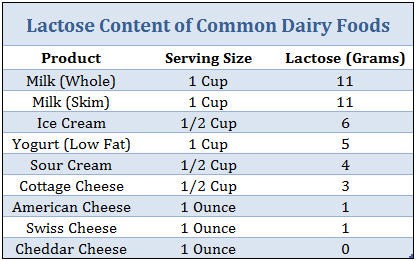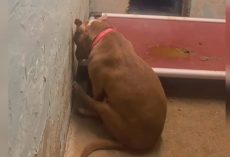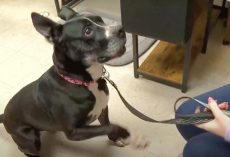Most dogs love cheese and will chow them down in no time when given the opportunity.
Obviously this doesn't mean that it's good for them. Most dogs will eat all kinds of things, regardless of the consequences.
Is Cheese Bad For Dogs?
Dog owners may wonder whether cheese is bad for dogs to eat. In small to moderate quantities, it usually is safe for dogs to eat, but over-consumption of cheese can cause digestive upsets in your dog.
What Cheese Provides
Cheese is a good source of protein for your dog. It also provides vitamins and minerals, such as calcium, Vitamin A, B-complex vitamins and essential fatty acids. A small piece of cheese can also provide the perfect camouflage for medications that your dog may need to take someday, so it can be helpful to offer your dog occasional treats of cheese, but only if his body can handle it.
Other Beneficial Dairy Products for Your Dog
Two dairy products that your dog should be able to consume in moderation are cottage cheese and plain yogurt. Both add benefits to his diet in different ways.
Cottage cheese can be a good protein source for a dog that has occasional episodes of diarrhea. It can also provide protein for a dog that is recovering from illness or injury.
If you’re planning to add cottage cheese to your dog’s diet, try to offer a brand that has lower levels of sodium and fat to further improve your dog’s overall health.
Plain yogurt with acidophilus cultures or a cultured milk supplement called kefir provide beneficial bacteria for your dog’s digestive system. These dairy products can help settle an upset stomach, or they can provide long-term digestive improvement from the cultures they provide to your dog’s digestive system. Yogurt provides probiotic supplements to improve digestive health while helping to remove some bacteria that aren’t healthy for your dog’s digestion.
Source: Vetinfo
Here's another source that discusses whether cheese and other dairy products are bad for dogs:
Some dogs have no problems digesting milk and dairy products. Yet others experience acute intestinal distress — like gas, diarrhea or vomiting — whenever they consume these kinds of foods.
It all comes down to how your dog handles a specific nutrient found in milk — a nutrient known as lactose.
So, what exactly is lactose?
Well, lactose is a kind of sugar. Not just one single sugar, but two sugar molecules chemically linked together.
In order for a dog to digest milk, the lactose must first be broken apart into its two basic, easy-to-absorb sugars.
And in order to do that, a dog’s body must be able to produce a special lactose-splitting enzyme known as lactase.
And that’s one thing most dogs can’t reliably do.
Like Humans — Dogs Can Suffer from Lactose Intolerance
Without lactase, a dog simply cannot digest dairy products. And acute intestinal symptoms nearly always arise.
Now, this inability to digest milk is infamously known as lactose intolerance. And it’s the same lactose intolerance so many humans suffer from every day.
So, if you’ve ever noticed your dog tends to develop gas or loose stools after having milk, there’s a good chance your pet may be suffering from this condition.
Knowing a Food’s Lactose Content Can Help
Now to be fair, and in rare cases, a dog can be allergic to the protein in milk1.
However, milk shouldn’t be considered toxic for a dog. Yet for dogs that are lactose intolerant (as so many actually are), dairy products can present a real problem.
Yet for those pets, there’s still hope.
That’s because a dog’s reaction to lactose can be directly related to the “dose”. The higher the lactose content, the greater the likely response.
Thankfully, not all dairy products contain the same amount of lactose. Many kinds of cheese and yogurt contain considerably less lactose than milk.
Take a look at this table. Notice how some milk products contain only a minimal amount of lactose per serving.
For example, notice how most cheeses contain very little lactose. About a gram per serving. Sometimes less. Now, compare that quantity to whole milk, which clocks in at a whopping 11 grams.
Source: DogFoodAdvisor
The Bottom Line
In a nutshell…
The lower the lactose content of any dairy product, the more likely it will be for your dog to tolerate consuming them without distress.
So, depending on the food, it may be OK to offer low-lactose dairy products to your dog. In fact, almost any cheese can make a great natural treat for any pet.
Related post: 35 Healthiest Human Foods You Can Feed Your Dog (And The 12 That Could Kill Your Dog)















Margaret Buckland
- Edit
Yes, my Thunder goes mad for cheese! He’s allowed a bit but not too often!
Paul Hayward
- Edit
Angela Hayward l dont know any shelties that like cheese do u . Know 2 that would trade us in for a piece lol
Chris Pigsy Hall
- Edit
My dog gets rainbow trout or samon for a treat stick to a good dry food is the best
Jack B. Smith
- Edit
Good information for dog lovers….
Becky Thackray
- Edit
Feed Doris cheese! Keli Smith x
Elizabeth Rutledge
- Edit
Works when they have the runs
Jackie Andrews
- Edit
All Milk products
Simon Mabbott-day
- Edit
Alex Mabbott-day
Ernestine Hipp
- Edit
,Millie loves cheese. I have to fight her off if I want a little piece.
Marlene Keshvari
- Edit
Cheese is actually bad to digest in people I hear..so no I would not give it to my dog….I do give him cottage cheese severL spoon dulls when stomach upset..a vet recommended years ago and it’s worked on all my dogs..only few spoons!!
Wendy Kane
- Edit
Robyn Kane
Matthew Stapp
- Edit
Kristina Stapp
Gary Elderman
- Edit
My boxer tests everything before consumption. He won’t wolf down anything even bacon.
Megan Cunningham
- Edit
Bailey Cunningham
Karen Garland
- Edit
Linda Bunce
Robert Christopher
- Edit
Keshia Chisom
Robert Bleck
- Edit
When I was young I thought blue cheese was just spoiled. Now that I’m old I haven’t changed my opinion.
Keith Ryan
- Edit
It’s OK… he doesn’t get upset after it… maybe with the Stilton
Daniel Brent
- Edit
Our bully is happy to have some cheese, but my god the farts afterwards are awful.
Jennifer Meier
- Edit
I make cheese ball pills every night. Cleo gets Medrol for her skin and Crissy gets a pain pill for her arthritis on her back. She must have hurt it when she was younger. They are only about 6 years old. I’m glad cheese doesn’t seem to bother either of them.